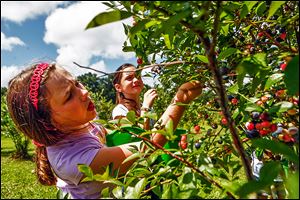
HEALTHY HARVEST COMES TO FRUITION
Blueberry knocks peach from lofty Georgia perch
Top crop netted state about $94M last year
7/22/2013
Grace Katherine James, 9, left, and Anna Baldwin, 8, look for ripe blueberries in the pick-your-own field in the Peach State, where blueberry sales have soared.
ATLANTA — What is the most valuable fruit crop produced in the Peach State?
This is not a trick question, but you may want to pause a second before answering.
Ready? It’s the blueberry.
Georgia is famous as a major producer of the peach, the fuzzy succulent orange fruit whose image appears on state license plates, “welcome to Georgia” billboards, and on road signs.
When driving in the capital city of Atlanta, you can pass the corner of Peachtree Street and Peachtree Center Avenue, just one block from West Peachtree Street.
There’s just one problem: Blueberries are Georgia’s most lucrative fruit crop, by far.
The value of blueberry production in Georgia beat the peach crop in 2005 — and the gap has grown even bigger since then, according to U.S. Department of Agriculture surveys.
Blueberries generated an estimated $94 million for Georgia growers in 2012, meaning the blueberry crop was more than three times as valuable as the nearly $30 million peach crop.
“It’s surprising around the country how many people don’t realize Georgia grows blueberries,” said Joe Cornelius, chairman of the Georgia Blueberry Commission and a farmer who grows about 170 acres of the crop.
He refuses to gloat about surpassing his fellow peach farmers.
“I don’t foresee Georgia changing to the blueberry state,” Mr. Cornelius said.
Analysts and growers say a combination of supply-and-demand economics coupled with a good growing environment propelled blueberries from a tiny crop to a profitable niche that dwarfs the famed peach.
Blueberries used to make up a relatively small percentage of the state’s fruit crop.
But major blueberry producers, particularly in Michigan, were searching for ways to get berries on the supermarket shelves earlier in the year.
They signed deals with growers in Georgia since the state started harvesting its berries in April, ahead of other producers except Florida and California, said Scott NeSmith, a horticulturist at the University of Georgia who studies blueberries. In Georgia, blueberry-killing frosts are infrequent.
Celebrated by physicians and nutritionists for their antioxidant qualities, blueberries are now greatly in demand among health-conscious consumers.
Average prices have risen from 48 cents a pound in 1993 to $1.34 in 2012, and the growth was among one of the main factors prompting farmers to plant larger and larger numbers of blueberry bushes. Too, Georgia farmers are looking to alternatives to traditional Southern crops such as tobacco and timber.